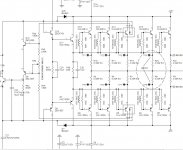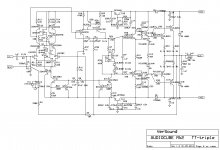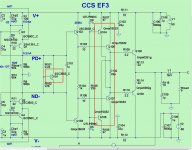Where to find papers to read more about " double diamond H stage"?
What's the benefits using thermal track OPS?
What's the benefits using thermal track OPS?
Where to find papers to read more about " double diamond H stage"?
What's the benefits using thermal track OPS?
Don't know any "papers". - I was inspired by the OPA660 IC ...
http://www.ti.com/lit/ds/symlink/opa660.pdf
Thermaltrak (diode) will instantly respond to OP junction temp. The diode is on the
same die as the transistor. The drawback is the proprietary nature of the device 🙁.
PS - The "infidel" is basically a radio frequency (RF) amp ported to audio use - NOTHING
matches it's speed !!
OS
Last edited:
I have seen that NAD M3 using tripple outputstage consisting of "super buffer" + CFP stage.
You can find servicemanual here "serviceengine.com"
Input / gainstage have extra small circuits for optimizing,
Please see if you see the benefits🙂
You can find servicemanual here "serviceengine.com"
Input / gainstage have extra small circuits for optimizing,
Please see if you see the benefits🙂
Last edited:
I have a few thernaltrak transistors. I'd like to learn how to use them.
Which ones to you've?
I have a few thernaltrak transistors. I'd like to learn how to use them.
There's the 990 , with it's 2 Trak's ...
OS
Attachments
I have a few thernaltrak transistors. I'd like to learn how to use them.
If you like you can use the EF3 from my ThermalTrak amp, last schematic here and the thread is this http://www.diyaudio.com/forums/solid-state/182554-thermaltrak-tmc-amp.html
This is working amp in everyday use.
Damir
Attachments
I have 16 pairs of MJL4302 and MJL4281🙂
They don´t seems to have "Thermal track"
They are from 2004 maybe they still are "top of the line" to be used with your "Kypton C" or Infidel V2🙂
They don´t seems to have "Thermal track"
They are from 2004 maybe they still are "top of the line" to be used with your "Kypton C" or Infidel V2🙂
Last edited:
There's the 990 , with it's 2 Trak's ...
OS
It seems from the schematic that they use 3 transistors for "thermal tracking"?
I have 16 pairs of MJL4302 and MJL4281🙂
They don´t seems to have "Thermal track"
They are from 2004 maybe they still are "top of the line" to be used with your "Kypton C" or Infidel V2🙂
On Semi's Thermaltrak are NJL series. They have two extra legs on them.
Qn ThermalTrack diode is not on transistor die , sm transistor or diode glued to collector lead is almost as good
What about tripple diamond amplifier, Infidel plus buffered diamond output stage (tripple output stage) from pic below. 😉
Integrated error correction (differential diamond stage) and minimal output bias current defined with second pair of CCS. 🙂
It's a great idea, in the simulator. However during startup and/or when passing signal it latches positive or negative due to positive feedback between the complimentary halves. I've had this same basic circuit stuck on a post-it note to my computer screen for months and still haven't been able to keep it from latching.
Kean, as basic principle to have error correction and min output bias this sch is worth to explore more. With a little help of current mirrors to simplify bias conditions and anti-latching circuitry in a form of diodes there could be a way to practical working circuit. Still some simm work ahead for all interested.
http://www.diyaudio.com/forums/solid-state/149324-self-type-3-ef-hybrid-triple-any-pointers-3.html
There is the "bible" link - above ....
All the guru's "chimed in" on that one - NOW we get to build !! 😀
(below) is the creation that got a lot of smiles 🙂🙂🙂 .
I just ran it with my better current models AND the 1KV/us "infidel". Stellar
performance. NO speed issue with this - faster than a standard EF3.
- much softer Xover glitch .... driver capacitance is actively "sucked " out by
the CCS's.
- CCS's and drivers thermally cancel each other , leaving 2Vbe for the spreader.
- Spreader can have R101 replaced by 2 thermaltrak diodes.
OS
There is the "bible" link - above ....
All the guru's "chimed in" on that one - NOW we get to build !! 😀
(below) is the creation that got a lot of smiles 🙂🙂🙂 .
I just ran it with my better current models AND the 1KV/us "infidel". Stellar
performance. NO speed issue with this - faster than a standard EF3.
- much softer Xover glitch .... driver capacitance is actively "sucked " out by
the CCS's.
- CCS's and drivers thermally cancel each other , leaving 2Vbe for the spreader.
- Spreader can have R101 replaced by 2 thermaltrak diodes.
OS
Attachments
If you like you can use the EF3 from my ThermalTrak amp, last schematic here and the thread is this http://www.diyaudio.com/forums/solid-state/182554-thermaltrak-tmc-amp.html
This is working amp in everyday use.
Damir
Hi Damir,
I just read through that thread. I may try etching a couple of boards and give it a try.
Thanks, Terry
Kean, as basic principle to have error correction and min output bias this sch is worth to explore more. With a little help of current mirrors to simplify bias conditions and anti-latching circuitry in a form of diodes there could be a way to practical working circuit. Still some simm work ahead for all interested.
I tried everything I could think of so far, but this circuit shows a great deal of promise if there is a way to stabilize it without changing the collector and emitter connections for the input transistors.
OS,
Do you propose to use this last schematic to update the SlewMonster or is this a new parallel design of an EF3 output section?
Do you propose to use this last schematic to update the SlewMonster or is this a new parallel design of an EF3 output section?
OS,
Do you propose to use this last schematic to update the SlewMonster or is this a new parallel design of an EF3 output section?
I have the present "slewmonster" right on my desk. Set it 5 days ago for 30mv
bias , still 30mv bias. Sounds absolutely wonderful , as well.
Present OPS is state of the art for BJT's.
Absolutely a "parallel design"....as I don't see too much of a "return" with a
more complex OPS.
The CCS's triple (or EF2 version) would be good for FET's and their big Ciss - this one "sucks"
it right out. 😀 Here , the fast toshiba 2sc4793/sa1837 drivers would
compliment either Vfet/Lfet nicely.
OS
Hi Damir,
I just read through that thread. I may try etching a couple of boards and give it a try.
Thanks, Terry
Hi Terry,
There is an error on the PCB, wrong trimmer pot position for the bias setting(result of the same error in the Cordell's book). If you are interested I can correct the PCB ( I corrected mine PCBs with a scalpel and wire) and send you the gerbers. The schematic a few post back is with correct trimmer pot position P1.
BR Damir
- Home
- Amplifiers
- Solid State
- Slewmaster - CFA vs. VFA "Rumble"


